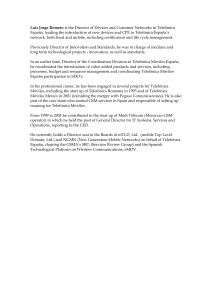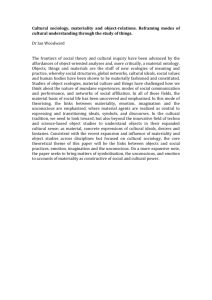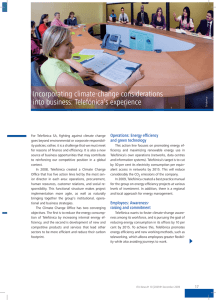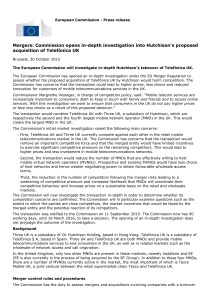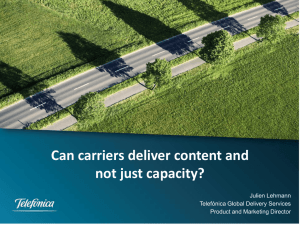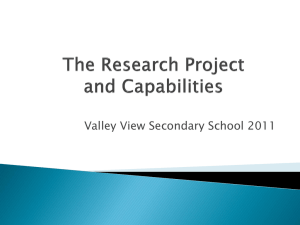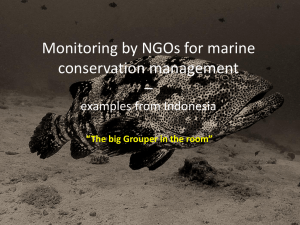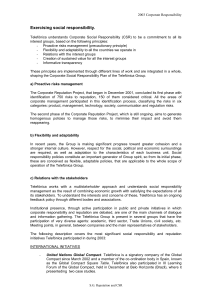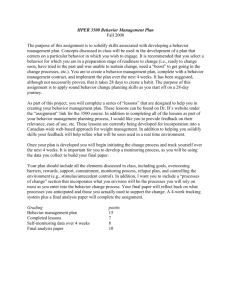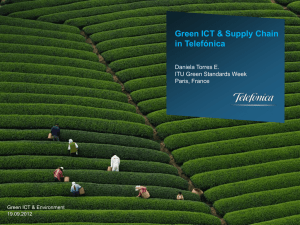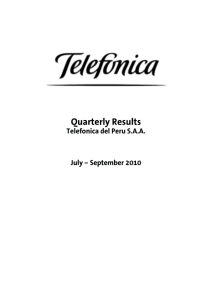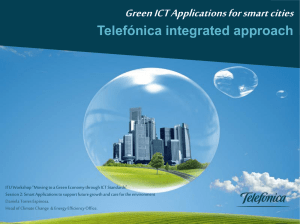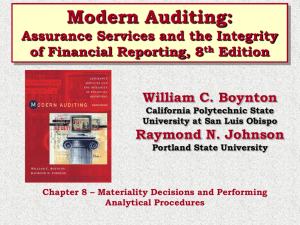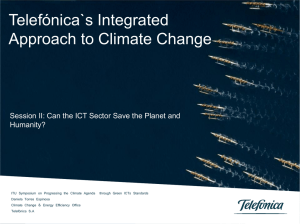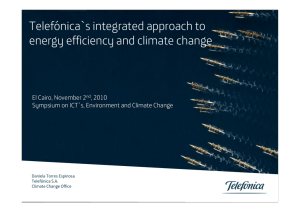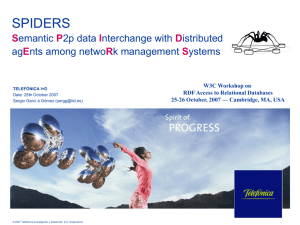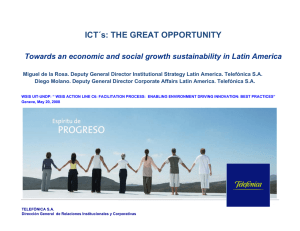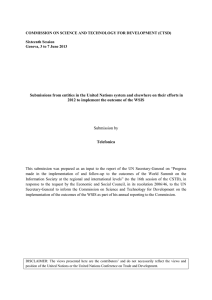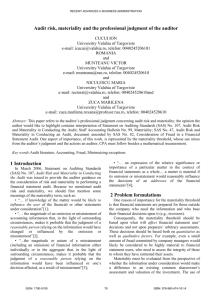Full PDF - Annual Report
advertisement
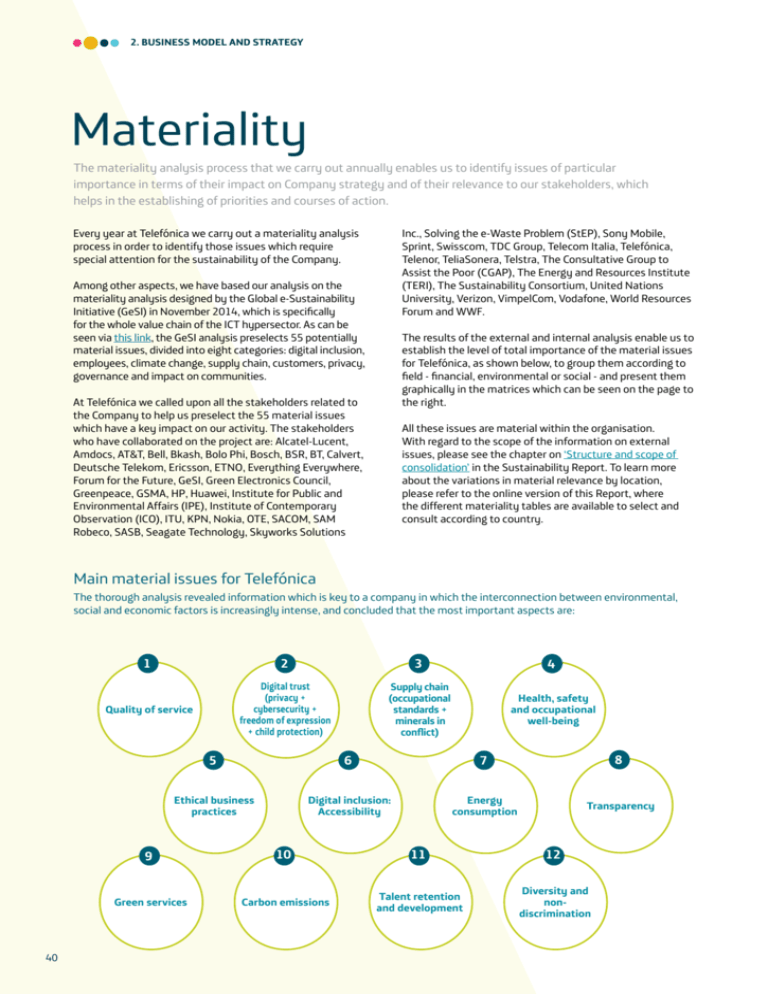
2. Business model and strategy Materiality The materiality analysis process that we carry out annually enables us to identify issues of particular importance in terms of their impact on Company strategy and of their relevance to our stakeholders, which helps in the establishing of priorities and courses of action. Every year at Telefónica we carry out a materiality analysis process in order to identify those issues which require special attention for the sustainability of the Company. Inc., Solving the e-Waste Problem (StEP), Sony Mobile, Sprint, Swisscom, TDC Group, Telecom Italia, Telefónica, Telenor, TeliaSonera, Telstra, The Consultative Group to Assist the Poor (CGAP), The Energy and Resources Institute (TERI), The Sustainability Consortium, United Nations University, Verizon, VimpelCom, Vodafone, World Resources Forum and WWF. Among other aspects, we have based our analysis on the materiality analysis designed by the Global e-Sustainability Initiative (GeSI) in November 2014, which is specifically for the whole value chain of the ICT hypersector. As can be seen via this link, the GeSI analysis preselects 55 potentially material issues, divided into eight categories: digital inclusion, employees, climate change, supply chain, customers, privacy, governance and impact on communities. The results of the external and internal analysis enable us to establish the level of total importance of the material issues for Telefónica, as shown below, to group them according to field - financial, environmental or social - and present them graphically in the matrices which can be seen on the page to the right. At Telefónica we called upon all the stakeholders related to the Company to help us preselect the 55 material issues which have a key impact on our activity. The stakeholders who have collaborated on the project are: Alcatel-Lucent, Amdocs, AT&T, Bell, Bkash, Bolo Phi, Bosch, BSR, BT, Calvert, Deutsche Telekom, Ericsson, ETNO, Everything Everywhere, Forum for the Future, GeSI, Green Electronics Council, Greenpeace, GSMA, HP, Huawei, Institute for Public and Environmental Affairs (IPE), Institute of Contemporary Observation (ICO), ITU, KPN, Nokia, OTE, SACOM, SAM Robeco, SASB, Seagate Technology, Skyworks Solutions All these issues are material within the organisation. With regard to the scope of the information on external issues, please see the chapter on ‘Structure and scope of consolidation’ in the Sustainability Report. To learn more about the variations in material relevance by location, please refer to the online version of this Report, where the different materiality tables are available to select and consult according to country. Main material issues for Telefónica The thorough analysis revealed information which is key to a company in which the interconnection between environmental, social and economic factors is increasingly intense, and concluded that the most important aspects are: 40 1 2 3 4 Quality of service Digital trust (privacy + cybersecurity + freedom of expression + child protection) Supply chain (occupational standards + minerals in conflict) Health, safety and occupational well-being 5 6 7 8 Ethical business practices Digital inclusion: Accessibility Energy consumption Transparency 9 10 11 12 Green services Carbon emissions Talent retention and development Diversity and nondiscrimination 2014 Telefónica Integrated Report + Economic Affairs Matrix 1 Relevance to stakeholders 1. Quality of service 2. Data security 3. Ethical business practice 4. Transparency 5. Tax contributions 6. Public policy and relations with public bodies 7. Impact on communities 8. Impact on customers' lifestyles 9. Innovation 10. Corporate governance 4 10 8 6 + Impact on strategy Social Affairs Matrix 1. Privacy 2. Online cybersecurity 3. Occupational standards in the supply chain 4. Freedom of expression 5. Child protection 6. Health, safety and occupational well-being 7. Accessibility 8. Minerals in conflict 9. Talent acquisition and development 10. Diversity Relevance to stakeholders 1 8 9 5 3 6 7 2 4 10 Impact on strategy + Environmental Affairs Matrix 1. Energy consumption 2. Green and Smart services 3. Carbon emissions 4. Reuse and recycling of devices 5. Waste electrical and electronic equipment (WEEE) 6. Electromagnetic fields in networks 7. Responsible network roll-out 8. Infrastructure sharing 9. Environmental management systems 10. Environment and climate change 11. Electromagnetic fields in devices 12. Adaptation to climate change 13. Water 14. Fluorinated gases 15. Renewable energy 16. Paper + Relevance to stakeholders - 5 7 9 - + 2 3 16 4 9 13 12 11 10 1 5 6 3 8 15 2 7 14 - Impact on strategy + 41
